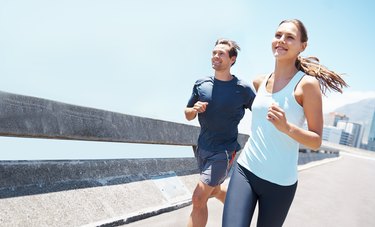
Exercise helps keep you fit and healthy by strengthening your muscles and making your heart beat faster. Your respiratory rate during exercise increases to make sure you are getting enough oxygen as your muscles, lungs, and heart all work together to move your body.
Tip
Your respiratory rate during exercise increases to allow more oxygen to reach your muscles and to expel the carbon dioxide waste. This works in conjunction with an increased heart rate to pump the blood and the release of the stimulating hormone, epinephrine.
Video of the Day
Respiration in Exercise
In order to reap the benefits of exercise, your heart and breathing rates must increase. Your muscles are pushing your blood back to your heart at a faster rate, so your heart must increase its rate of pumping to match. Some of the blood pumped by the heart travels to the lungs to get rid of carbon dioxide and pick up oxygen.
Video of the Day
The increase in heart rate stimulates your breathing rate. With an increase in heart rate, your blood pumps through your muscles at a faster rate, leaving less time for oxygen uptake. Having more oxygen available in the blood, from a faster breathing rate, helps the muscles get the amount they need.
Increased Oxygen Demand
Your muscles are working harder during exercise and that means their demand for oxygen increases. This happens because oxygen is needed to burn calories more efficiently. Since the blood picks up oxygen in the lungs, and the demand for oxygen increases during exercise, the lungs must work harder. With a faster breathing rate, more oxygen is picked up at the lungs for delivery to the working muscles.
Carbon Dioxide Removal
A byproduct of metabolism is carbon dioxide. Part of the lungs' function is to rid the blood of carbon dioxide. As exercise continues, or exercise intensity increases, more carbon dioxide is produced and needs to be removed. Increased breathing rate allows carbon dioxide to be expired more rapidly.
Body Temperature Regulation
Another by-product of metabolism is heat. As your body temperature rises, signals are sent to the nerves and muscles of the respiratory system to increase the breathing rate. The mechanism of this response is unknown, but increased ventilation is also often present accompanying fever.
Change in Hormone Levels
At the onset of exercise, the brain signals increases in heart and breathing rates in anticipation of the increased need for oxygen and carbon dioxide exchange of exercise. Once exercise begins, circulating levels of the hormone epinephrine — also referred to as adrenaline — increase. This increase stimulates ventilation as well.
Lung Problems and Exercise
Exercise may be challenging if you have a lung condition such as asthma or COPD. Discuss the best workout plan for your condition with your doctor. Treatment may include inhaled steroids to keep your airways open or adjusting your routine to include more rest time. Build your stamina slowly and be sure to include a warm up and cool down with each workout.
Warning
While you may notice an increased respiratory rate while exercising, you should not experience shortness of breath or chest pain. If you do, stop immediately and contact your doctor.